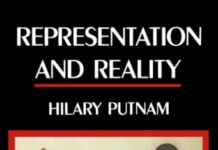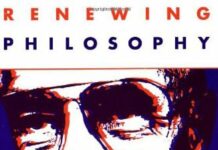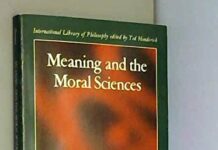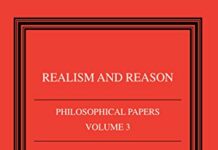
Ebook Info
- Published: 2009
- Number of pages: 176 pages
- Format: PDF
- File Size: 0.47 MB
- Authors: Hilary PUTNAM
Description
In this brief book one of the most distinguished living American philosophers takes up the question of whether ethical judgments can properly be considered objective–a question that has vexed philosophers over the past century. Reviewing what he deems the disastrous consequences of ontology’s influence on analytic philosophy–in particular, the contortions it imposes upon debates about the objective of ethical judgments–Putnam proposes abandoning the very idea of ontology.
User’s Reviews
Reviews from Amazon users which were colected at the time this book was published on the website:
⭐I was disappointed in this book. I was hoping for a basic introduction to Putnam’s work, which for some philosophers a series of lectures serves the purpose well. In this case, Putnam is almost entirely responding to or drawing off of the work of numerous other philosophers, with excerpts aimed at very narrow points and not very illuminating without a thorough familiarity with their work. Argumentation for his positive points was brief and unsatisfying, nor was it really very effective as a review of the field. Essentially, it read like someone bickering with his opponents and praising his allies more than providing any kind of useful cohesive view of his positions. A shame, because from what I was able to discern, his positions are interesting.
⭐There’s a lot of interesting philosophy in this slim volume, but the arguments aren’t filled out in the way they should be and too many of its discussions are left superficial and unnecessarily compressed. Nevertheless, this is definitely worth a look for people interested in meta-ethics (and in metaphysics). There’s no doubt that Putnam is a major contemporary philosopher, and he seems to be in the process of developing a distinctive meta-ethical view. Part of that process is on display in the lectures constituting the first part of this book.The focus of Part I, which encompasses the first two-thirds of the volume, is a sustained attack on the assumptions that Putnam believes underlie ontology (the study of what types of things exist) as it has descended from Quine’s “On What There Is” and as it is practiced among contemporary analytic philosophers. There are two assumptions he hopes to undermine: (i) the assumption that there is a single right answer to ontological questions, and (ii) the assumption that that there is some close connection between ontological issues and issues of objectivity, since objective disciplines are those in which we can and do truly describe objects (i.e. facts, entities, properties, etc.). He thinks both of these assumptions are false, and that this allows us to draw certain conclusions about the nature and status of ethics. The most important conclusion is that we don’t need some special ethical metaphysics–ethical entities, facts, or properties–to have ethical objectivity. So the argument here is largely negative, inasmuch as Putnam’s fundamental aim is to clear away certain philosophical errors that have led people to be suspicious of the objectivity of ethics. (Naturally, this suggests that Putnam is committed to a positive project of arguing for some form objectivism about ethics–but the positive project is largely ignored here and the outlines of his objectivism remain unclear here.)Putnam first argues against the assumption that there is a single right answer to ontological questions. Here he argues for what he calls ‘conceptual relativity,’ according to which the existence of the sorts of things with which ontologists are concerned is a matter of convention, of the way in which we choose to talk here. Consequently, there is no single right answer to the question of whether something (e.g. sets of objects) exists or not. There’s no independent fact of the matter here; there’s nothing to decide between the various answers. We have different ways of talking about these things, and Putnam thinks it’s a “silly” question to ask whether one way of talking is to be preferred to another. It’s not simply that we don’t know enough to determine the right answer; it’s not that the question is one we lack the resources to answer. It is, rather, that the question of which answer is “right” really hasn’t been given a clear sense. But ontology as it is currently practiced rests on an assumption that these things aren’t conventional, that there is a single right answer to these questions. Thus, if the thesis of conceptual relativity is true, there isn’t any such answer and ontology is a hopeless enterprise.According to Putnam, the other general problem with ontology is that it is connected to an assumption that there is an intimate connection between objectivity in various disciplines and the existence of objects (facts, entities, properties) as the subject of those disciplines. This is relevant to ethics because he thinks we should think of ethics as possessing “objectivity without objects.” One of the traditional problems with understanding ethics as objective is understanding just what moral facts, properties, etc. are like. Putnam wants to argue that this apparent difficulty rests on a confusion about the nature of objectivity, for there don’t have to be objective moral value entities or non-natural properties or moral facts in order for us to understand ethics as being objective. And he argues for this conclusion by drawing a comparison with logic and mathematics, disciplines that seem objective–they seem to admit of truth and falsity, to allow for allow for rational argument, etc.–and yet don’t seem to be about distinctive sorts of objects. Putnam thinks a proper appreciation of the subject will reveal that the same is true of ethics.Importantly, Putnam’s advocation of a sort of pluralism underlies his thinking idea here. Language, he wants to claim, does many different things, and failing to recognize this can lead to the problematic assumptions contemporary analytic ontologists tend to make. Putnam himself draws the comparison of his ideas here with the Wittgensteinian idea that there several distinct language games, and that none of them is the ultimate to which all the others must be reduced. Moral language, logical language, mathematical language–these are all objective, and yet they don’t describe facts in the way that scientific language and language about ordinary empirical objects do. They do something else, and it’s only a failure to appreciate the manifold ways in which language is used–the many different uses to which it can be put–that leads us to think that all these uses of language involve trying to describe special sorts of facts. Thinking that we need to posit special ethical facts, properties, etc. to understand ethics as objective is to inappropriately apply standards from another discipline to ethics. What we need to realize about ethical objectivity, about ethical truth and rational ethical argument, is that an understanding of it is something we pick up only from within ethical discourse and practice.As interesting as some of the ideas here are, this book could stand to be about twice as long as it actually is. The first part was originally a series of lectures, and it reads that way: it’s unnecessarily repetitious in places, and too sketchy in others. Furthermore, it’s not altogether clear what Putnam’s positive view is supposed to be since he never explains just what ethical objectivity is supposed to consist in. And while Putnam’s characteristic erudition is on display here–he draws on a thorough knowledge of, inter alia, contemporary analytic philosophy, logic, mathematics, and the history of philosophy–too often his invocation of other philosophers is used to paper over weaknesses in his own arguments.
⭐Hilary Putnam is a distinguished and prolific American philosopher whose views and philosophical interests have changed many times during a long career. His recent book “Ethics without Ontology” (2004) is a compiliation of two series of lectures he gave during 2001. The first part of the book consists of four lectures Putnam delivered at the University of Perugia while the second part consists of the two Spinoza lectures Putnam gave while serving as the Spinoza Visiting Professor of Philosophy at the University of Amsterdam. Both series of lectures have as their theme a reshifting of the concept of “objectivity” particularly as applied to ethics. In attempting to explain the nature of objectivity, Putnam tries to decouple ethics from ontology and metaphysics, a coupling which, he believes, has produced a distortion in the attempt to understand ethics. This distortion results on one hand from Platonism with its inflationary metaphysics and on the other hand from the converse of Platonism in an eliminative or reductionist metaphysics. Such eliminativism or reductionism, Putnam argues, leads to a broad skepticism, including a skepticism about the objectivity of ethical judgments. Putnam’s major philosophical hero, in explaining how ethics can be objective without being metaphysical is the American pragmatist John Dewey. Putnam finds Dewey’s ethics situational and particular in character, fallibilistic rather than dogmatic, and inclined to see ethical judgments as provisional — cast in terms of better or worse — rather than as absolutes.The four initial lectures have largely a brush-clearing goal as Putnam tries to separate the concept of objectivity from Ontology. In the first lecture, Putnam sets forth his goal of divorcing ethical understanding from a theory of being — of “what there is.” In addition to Dewey, Putnam praises the thinking of Emanuel Levinas, Kant, and Aristotle. The second and third lectures are the heart of Putnam’s approach as he argues that there are variant concepts of existence and of identity (using as an example a type of formal logic known as “mereology”) and that different kinds of conceptual forms and of discourse can be regarded as objective without commiting one to the existence of the subject under discussion. In these lectures Putnam argues that we can speak reasonably in a variety of different conceptual schemes and that, for some questions in mathematics or logic, the question of “existence” does not arise in assessing the truth of the claims. Putnam’s claim is that statements can be true and rational without being descriptive (about objects). In the final lecture of the set, Putnam applies his analysis to ethical statements and pronounces the death of Ontology in considering ethical questions.In the Spinoza lectures, Putnam has a more positive goal. He develops a concept of philosophy as “reflective transcendence” which he understands as a willingness to step back from received opinion, commonplaces, and religious dogma and to think critically. Again, Putnam’s conclusion is that “reflective transcendence”, which is rather a traditional way of understanding the goal of the philosophical enterprise, does not require ontology.In his first lecture, Putnam traces three periods of philosophical entlightenment, the first Plato’s, the second the seventeenth-century Enlightenment and the third an ongoing entlightenment project began by the pragmatism of Dewey. He says interesting, if hastily-developed things, about metaphysics, social philosophy, and ethics under each of these three enlightment projects. In the second lecture, Putnam attacks various post-modernist critics of the possibility of — or even the concept of — philosophical enlightenment, including Foucault, Derrida, and Richard Rorty.Putnam’s lectures are engagingly written and display an enviable breadth of erudition and thought. As a result of their format as lectures they move rather too quickly. They are suggestive, rather than full philosophical treatments. In particular, I thought that Dewey’s pragmatism needed to be developed more fully to make it a convincing alternative to Ontology. Putnam praises Dewey’s pragmatism a good deal, but does not give it a sufficient fleshing-out to permit even a warrantly assertible conclusion of Putnam’s claims on its behalf.For all his criticism of Ontology, Putnam practices philosophy in an ambitious manner. He decries overspecialization and mere technical skill and seeks in “reflective transcendence” to “regain the integrated vision which philosophy has always aspired to” (p. 1). This is a challenging, thoughtful work.Robin Friedman
Keywords
Free Download Ethics without Ontology in PDF format
Ethics without Ontology PDF Free Download
Download Ethics without Ontology 2009 PDF Free
Ethics without Ontology 2009 PDF Free Download
Download Ethics without Ontology PDF
Free Download Ebook Ethics without Ontology





